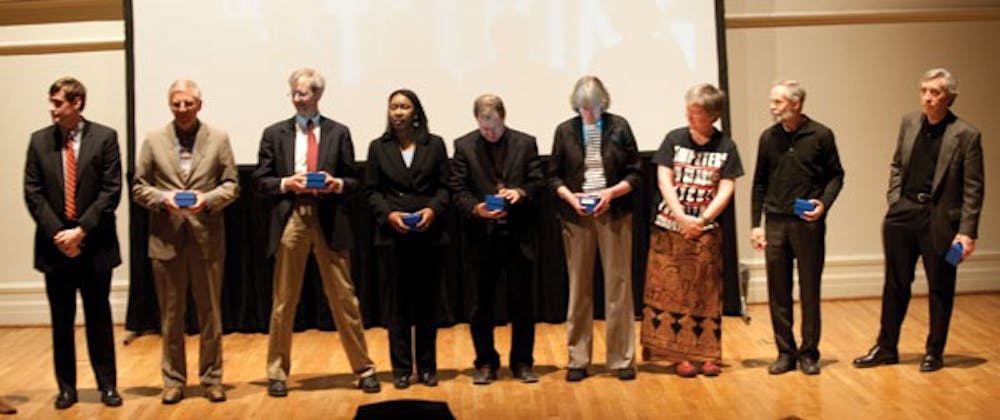Eight University professors addressed students in Old Cabell Hall last night for the Student Council-sponsored event "Look Hoos Talking."
Academic Affairs Committee Co-Chair Tatiana Matthews said the speakers were asked to share their grandest ideas in 12 minutes. Tickets for the 846 seats in Cabell Hall were claimed less than 24 hours after becoming available to students. Council also streamed the event online.
"Look Hoos Talking" was modeled after a similar event at Harvard University, "Harvard Thinks Big," Co-Chair Johnny Vroom said. He heard about Harvard's program from a friend who attends the school and approached Council President Colin Hood with the concept. Part of Vroom's motivation stemmed from a desire to promote intellectualism "that doesn't go on in the classroom," he said.
"I just decided to bring that sort of a concept to U.Va.," Vroom said. "I wanted to create this new phenomenon that hopefully will continue for years to come."
Vroom and Matthews circulated a survey to students via e-mail asking which professors they would most like to hear speak and selected a variety of the most popular choices.
"We wanted [the speakers] to be professors that students really wanted to see," Matthews said. After examining the survey results, "it was just a matter of who could do it," she said.
The eight participants were Economics Prof. Kenneth Elzinga, Psychology Prof. Timothy Wilson, History Prof. Claudrena Harold, Global Development Studies Prof. Richard Handler, Biology Prof. Deborah Roach, English Prof. Elizabeth Fowler, Engineering Prof. Dana Elzey and History Prof. Gary Gallagher.
Roach spoke about the differences in aging patterns in different species, highlighting humans, lobsters and the plantago lanceolata weed. Roach's research revealed that some species age only under stress, which she labeled condition-dependent aging. Roach concluded by discussing what future research will ultimately uncover about the human aging process.
"To have a long life, you have to have a slow rate of aging," Roach said. "Just your looks alone say something about your rate of aging."
Fowler's speech covered the topic of finding an "Emergency Poem" to memorize and draw upon for strength in times of trial. She referenced W.B. Yeats's poem "Lake Isle of Innisfree" as her emergency poem, saying that poetry, as something that can be internalized, provides a stronger source of support than any "mere distractions" such as television shows.
"If you are human, you will encounter storms, wars, injuries," Fowler said. "You have to wrap your voice around [the poet's] and around the echoes of the many people who have said it before you or with you. When you get the core knocked out of you, chanting your poem will help bring it back."
Gallagher finished the night with a speech about the scope of history and how modern American perspectives do not always succeed in grasping all of its dynamics. The 24-hour news cycle, Gallagher said, largely contributes to a culture of blowing modern events out of proportion.
"I can think of at least one time when we were more divided than we are now," Gallagher said, referring to his concentration in Civil War history. Overall, he said, "[The American] relationship [with history] often fluctuates between complete indifference and outright hostility."
The Academic Affairs Committee plans to repeat the event annually.
"There are gems in every school and every department," Matthews said. "Part of [the purpose of] this event was to expose students to [professors] they wouldn't normally hear about"







